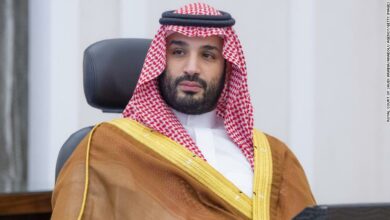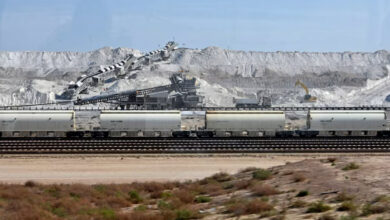Dubai–Saudi Arabian shares suffered the biggest fall in more than two years and oil prices spiked higher on Tuesday as the focus of concern about political unrest spread to the kingdom.
Selling on the largest Gulf Arab bourse gained pace towards the final hour of trade after human rights activists said authorities had detained a Shia cleric, sparking fears of sectarian strife. Rumours, later denied, of military activity also hit the market.
The news coincided with the first handouts in a US$37 billion social benefits distribution aimed at easing the pain of inflation and unemployment and averting the popular unrest that has spread across the Arab world.
The Saudi index fell 6.8 percent in its biggest drop since November 2008 to its lowest close since July 13, 2009.
"It looks like investors of all class and type are shunning the markets," said Nadi Bargouti, head of asset management at Shuaa Capital. "No single person, no single portfolio can move the markets to this extent. This is a complete shock."
Brent crude LCOc1 rose more than a dollar in response to a report in an Egyptian newspaper that Saudi Arabia, the world's largest oil exporter, had sent tanks to Bahrain, but a Saudi official said there was no truth in the report.
Al-Masry Al-Youm on Monday cited eyewitnesses as saying that they saw about 30 tanks being transported into Bahrain from Saudi Arabia along the King Fahd causeway. The report, however, added that commuters traveling along the 25-km causeway “could not confirm whether the tanks belonged to the Saudi military”.
One-year Saudi riyal forwards hit their weakest in two years, trading as high as 75 points, up from Monday's close of 50/70 points and implying a 0.2 percent weakening in the currency.
"A little bit of tension and panic took the market to 75 in the one-year. We closed for the day at plus 50/70," said Lyndon Loos, head of MENA forex trading at Standard Chartered in Dubai.
Middle East markets have taken a hit in recent weeks as popular uprisings unseated veteran rulers in Egypt and Tunisia. Declines steepened as unrest reached the oil-producing Gulf Arab states, with deadly protests erupting in Bahrain and Oman.
Saudi Basic Industries Corp (SABIC), the Arab world's largest listed company, fell 7.8 percent and Samba Financial Group lost 8.6 percent on Tuesday.
"Everyone is getting out …You see what's happening in Muscat and Bahrain? People are scared this might happen in Saudi as well," said a Riyadh-based analyst who asked not to be identified.
Earlier this week it emerged that investment funds operating in the Middle East North Africa (MENA) region are refusing redemption requests by clients following a prolonged closure of Egypt's bourse and a slump in stock market values.
The sharp drops in asset prices have prompted Saudi state-owned institutions to step in and attempt to support stocks, sources said, but the rapid selling overshadowed their presence in the market.
The General Organization for Social Insurance (GOSI), a quasi-state pension fund, bought petrochemical stocks on Monday, helping to stem losses, two sources told Reuters.
The fund, mainly targeted petrochemicals stocks, traders said, including Yanbu National Petrochemical Co (Yansab) 2290.SE and National Industrialization Co. (Tasnee) 2060.SE.
But shares then tumbled after Reuters reported human rights activists saying Saudi authorities had detained a Shia cleric in the oil-producing Eastern Province after he called for a constitutional monarchy.
GOSI's ownership in Yansab rose to 9.7 percent from 9.2 percent after Monday's purchase, a fund manager said. The pension fund's Tasnee holding rose to 7 percent from 6.2 percent.
The Dubai and Qatar indexes halted declines, but gave back most of their early gains as Saudi stocks fell.




